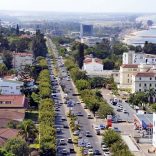Mozambican judges push for salary reform
Mozambique: Cost of living forces families in Maputo to cut food purchases

Photo: Lusa
The cost of living in Maputo has forced Luísa to eat more vegetables, Ana to give up beef, Ismael to buy electricity piecemeal and Adelaide to remind Frelimo that it will need her vote in the next elections.
A vendor for more than 20 years at the Xipamanine market, one of the largest in Maputo, Luísa Timane tells Lusa that she has never witnessed a crisis like the current one, which has changed even her habits.
“We [my husband and I] were only able to buy vegetables for the house; now it’s just a matter of buying vegetables and bread for the children,” she says, while waiting for customers at the open-air stand where she sells potatoes and onions in bags.
Before, she would go home at 3:00 p.m., because the goods would be sold early, but now he has to wait until around 6:00 p.m., because buyers want to haggle over the price and buy a ten-kilogram bag of onions for 550 meticais (eight Euros) , the same price which Luísa Timane pays in the Zimpeto wholesale market, in Maputo, leaving her with no profit.
Ana Hobjana, who sells second-hand clothing at Xipamanine, says she has eliminated meat from her diet and buys only a little rice and cornmeal because finances are tight.
“Everything is gone, I don’t even put onions in my food anymore, everything is so gone that we leave everything in God’s hands,” Hobjana says, letting slip her lack of faith in the ability of humans to address the situation.
Ismael Raul Mussá left Mozambique Island, in the north of the country, for the capital 15 years ago, looking for a better life, but says that the situation is only getting worse with each passing day.
“With 200 meticais for electricity [about three Euros], I don’t make it further than three days; now I have to buy electricity every day,” because the state electric company has increased the price of energy, he says.
A few months ago, he would buy 25 kilo bags of rice, but with the increase in the price of the product, he has started to buy 10 kilo bags for his family of five.
They no longer drink soft drinks at home, and, in addition to food, Ismael Raul Ali has to pay his three children’s school expenses.
A carpenter and Muslim, he ends the interview with a quote from the Koran, which he translates into Portuguese as: “I believe that God is unique” – an expression of his faith in better days to come.
Shopping in Xipamanine, Eunice Chemane says that she takes little home, and has had to cut back on her purchases, as money buys less and less.
“I reduced frying, because with 1,000 meticais [14.9 Euros] I could buy onions and potatoes and a couple of litres of cooking oil, but now a 10-kilogram bag of onion costs 600 meticais [about nine Euros],” she explains.
“And the aggravating factor is that for 600 meticais, I can get as little as seven kilos, due to the (vendors) tampering with the scales,” she complains.













Leave a Reply
Be the First to Comment!
You must be logged in to post a comment.
You must be logged in to post a comment.